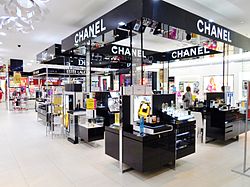
The cosmetic industry describes the industry that manufactures and distributes cosmetic products. These include colour cosmetics, like foundation and mascara, skincare such as moisturisers and cleansers, haircare such as shampoos, conditioners and hair colours, and toiletries such as bubble bath and soap. The manufacturing industry is dominated by a small number of multinational corporations that originated in the early 20th century, but the distribution and sale of cosmetics is spread among a wide range of different businesses. Cosmetics must be safe when customers use them in accordance with the label's instructions or in the conventional or expected manner. One measure a producer may take to guarantee the safety of a cosmetic product is product testing. FDA occasionally does testing as part of its research program or when looking into potential safety issues with a product. Both the cosmetics business and consumers can benefit from the FDA's resources on product testing.
The largest cosmetic companies are L'Oreal, Estée Lauder, Coty, Nivea, Shiseido and Chanel.[1] The market volume of the cosmetics industry in Europe and the United States is about EUR €70 billion per year, according to a 2005 publication.[2] The worldwide cosmetics and perfume industry currently generates an estimated annual turnover of US$170 billion (according to Eurostaf – May 2007). Europe is the leading market, representing approximately €63 billion[as of?].
- ^ "Top 10 Cosmetic Companies in the World: The List". American Cosmetic Association. 2023. Retrieved 5 March 2023.
- ^ Schneider, Günther; Gohla, Sven; Schreiber, Jörg; Kaden, Waltraud; Schönrock, Uwe; Schmidt-Lewerkühne, Hartmut; Kuschel, Annegret; Petsitis, Xenia; Pape, Wolfgang; Ippen, Hellmut; Diembeck, Walter (2001). "Skin Cosmetics". Ullmann's Encyclopedia of Industrial Chemistry. doi:10.1002/14356007.a24_219. ISBN 3-527-30673-0.